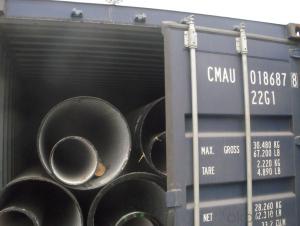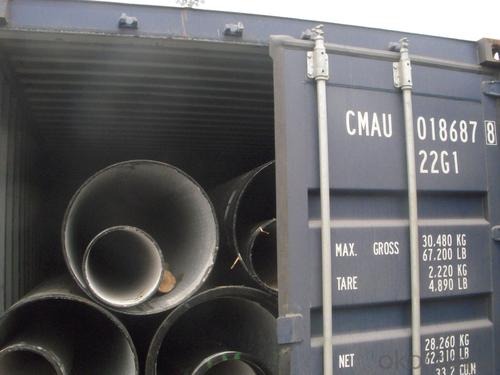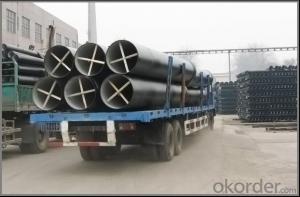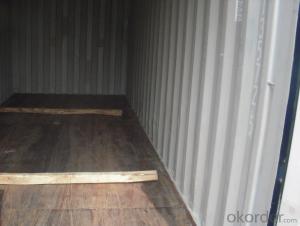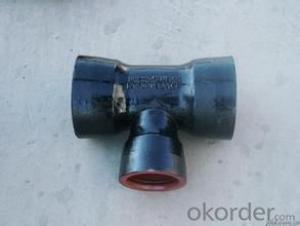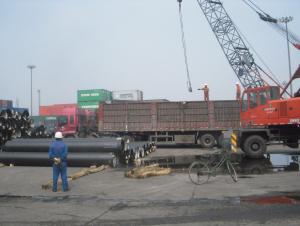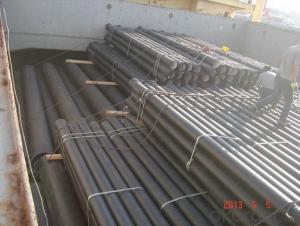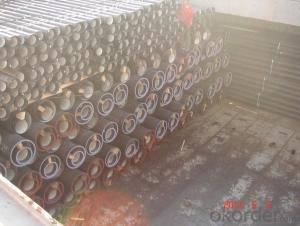DUCTILE IRON PIPES AND PIPE FITTINGS K8 DN350
- Loading Port:
- Tianjin
- Payment Terms:
- TT OR LC
- Min Order Qty:
- 25 m.t
- Supply Capability:
- 30000 m.t/month
OKorder Service Pledge
OKorder Financial Service
You Might Also Like
Material : Ductile Cast Iron
Size Range : DN 80mm to DN 2000mm
Unit Effective Length : 6m or 5.7m
Manufacture Standard: ISO 2531:1998/ EN 545:2006/EN 598:2007
Annual capacity : 200,000 tons
Coating Exterior: Zinc 130g/m2 according to ISO 8179-1 and bitumen coating 70 microns.
Cement Interior: Portland Cement/ High Alumina Cement/ Sulphate Resisting Cement Lining according to ISO 4179
Special requirements on external coating and internal lining can be applied
We also provide accessories such as SBR/EPDM rubber gaskets, lubricant paste, pipe caps, PE sleeves, etc.
Additional Parts:
Each pipe is strictly inspected according to related standard to ensure permanently high performance.
Easy Installation at site and service free for life
Long Service Lifespan
Quotation will arrive you within 24hours once we get your inquiry.
We guarantee offering you a competitive price.
A copy of original inspection reports of pipes will be offered after shipment.
Photos of loading process will be sent to the customer after shipment effect.
We will follow-up the delivery progress after shipment effect and update to the customer on weekly basis.
- Q: How does ductile iron pipe handle soil movements and settlements?
- Ductile iron pipe has excellent resistance to soil movements and settlements due to its high tensile strength and flexibility. The pipe's ability to withstand soil loads and settle without compromising its structural integrity makes it a reliable choice for underground applications. Additionally, the pipe's joint design allows for some degree of movement, further reducing the risk of damage or failure.
- Q: How are ductile iron pipes installed?
- Ductile iron pipes are typically installed using the following method. First, the trench is excavated to the required depth and width. The bottom of the trench is then carefully leveled and compacted to provide a stable foundation. Next, a bedding material, usually a sand and gravel mixture, is placed at the bottom of the trench. This bedding material helps to support the pipe and distribute the load evenly. It also serves to protect the pipe from any sharp objects that may be present in the soil. Once the bedding is prepared, the ductile iron pipes are carefully lowered into the trench and aligned to the desired position. It is important to ensure that the pipes are properly aligned and have the correct slope for efficient water flow. After the pipes are in place, they are joined together using a mechanical joint or a push-on joint system. These joints are designed to provide a secure and leak-free connection between the pipes. The joints are typically sealed using rubber gaskets, which help to create a watertight seal. Once the pipes are joined, the trench is backfilled with the excavated soil, taking care to compact it in layers to prevent settlement. The backfilling process is usually done in stages to allow for proper compaction. Finally, the installation is completed by connecting the ductile iron pipes to the existing water supply system or other pipes using appropriate fittings and valves. Pressure testing may also be carried out to ensure the integrity of the installation. Overall, the installation of ductile iron pipes requires careful planning, proper alignment, and secure jointing to ensure a long-lasting and reliable water supply system.
- Q: Are ductile iron pipes resistant to acid attacks?
- Generally, ductile iron pipes exhibit resistance to acid attacks. Ductile iron, a form of cast iron which has undergone magnesium treatment to enhance its strength and ductility, produces a more durable material capable of withstanding corrosive conditions, including acids. Nevertheless, it is crucial to acknowledge that the resistance level may vary depending on the specific acid type and concentration involved. In highly corrosive environments, where powerful acids or high concentrations are present, it may be necessary to implement additional protective measures such as applying a lining or coating to the pipes. Moreover, regular inspection and maintenance are vital to ensure the long-term durability and resistance of ductile iron pipes.
- Q: What are the specifications of cast iron pipes?
- Compared with grey cast iron pipe, ductile iron pipe has higher strength, better toughness, thinner tube wall, less metal consumption, and can bear higher pressure. The effective length is 5 meters and 6 meters. According to the wall thickness, it is divided into two grades P and G. It is the development direction of cast iron pipe.
- Q: What are the specifications for the installation of water ball iron pipes?
- Groove support: according to the groove soil, groundwater, slotted cross section, load conditions and other factors, the design requirements are firm and reliable, to prevent landslides, support, shall not impede the lower pipe and stable pipe.
- Q: What is the expected fatigue life of ductile iron pipes under cyclic loading?
- The expected fatigue life of ductile iron pipes under cyclic loading can vary depending on various factors such as the material properties, design considerations, loading conditions, and maintenance practices. However, ductile iron pipes are generally known for their excellent fatigue resistance, and when properly designed and installed, they can have a long fatigue life of several decades or more.
- Q: Do ductile iron pipes require cathodic protection?
- Yes, ductile iron pipes require cathodic protection. Cathodic protection is a technique used to protect metallic structures from corrosion by making them the cathode of an electrochemical cell. Ductile iron pipes are susceptible to corrosion, especially in aggressive soil conditions or when in contact with water containing high levels of corrosive substances such as chlorides or sulfates. Cathodic protection helps prevent corrosion by applying a direct electrical current to the pipe, which counteracts the natural corrosion process. This method ensures the longevity and integrity of the ductile iron pipes, reducing the need for frequent repairs or replacements.
- Q: How do ductile iron pipes handle cyclic loading in offshore applications?
- Ductile iron pipes handle cyclic loading in offshore applications quite effectively. The inherent flexibility and toughness of ductile iron allow it to withstand the repeated stresses and strains caused by cyclic loading, such as wave action or tidal forces. Additionally, the high fatigue resistance of ductile iron ensures that it can endure the continuous loading and unloading cycles without experiencing significant degradation or failure. Overall, ductile iron pipes are well-suited for offshore applications where cyclic loading is a common occurrence.
- Q: The design uses water supply ductile iron pipe, PE corrosion protection pipe, HDPE pipe, please ask that good? What's the price of the two?
- PE pipe is hot melt connection (with thick wall smooth type, don't use the wavy), has the advantages of convenient connection, not affected by terrain, but should pay attention to cold and rain when try not to do, otherwise easily lead to cracks or Water Leakage interface touch interface. The disadvantage is not pressure, heavy machinery on the flat, but the problem is not, as long as the water does not leak, do not need to redo. Also, PE price volatility is relatively large, the size of the price difference is relatively large, a few more runs to ask the price.
- Q: Can ductile iron pipes be used for rainwater harvesting systems?
- Yes, ductile iron pipes can be used for rainwater harvesting systems. Ductile iron pipes are known for their durability and strength, making them suitable for various applications, including rainwater collection and storage. They can effectively transport rainwater from collection points to storage tanks, ensuring a reliable and efficient rainwater harvesting system.
Send your message to us
DUCTILE IRON PIPES AND PIPE FITTINGS K8 DN350
- Loading Port:
- Tianjin
- Payment Terms:
- TT OR LC
- Min Order Qty:
- 25 m.t
- Supply Capability:
- 30000 m.t/month
OKorder Service Pledge
OKorder Financial Service
Similar products
Hot products
Hot Searches
Related keywords
